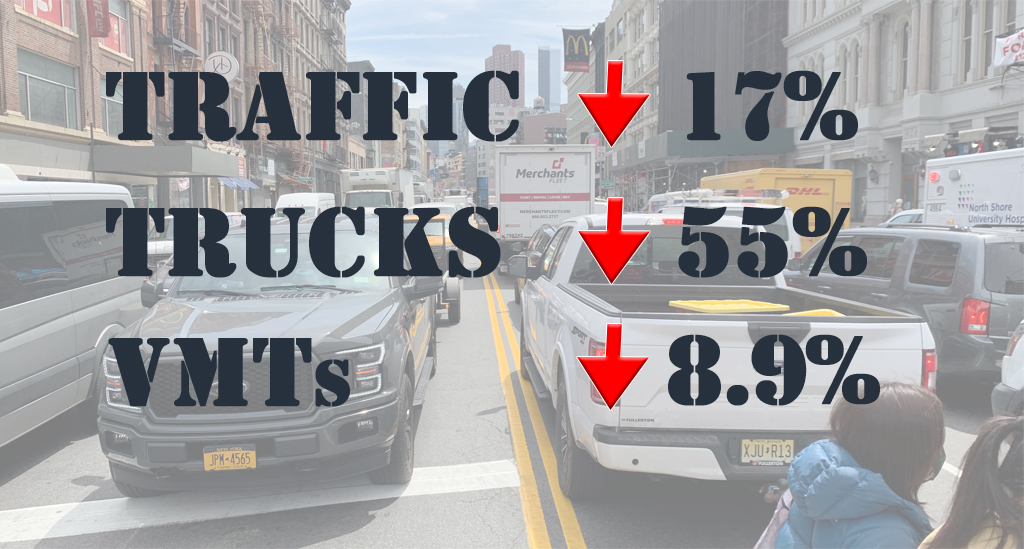Since Gov. Hochul's June 5 announcement that she had killed congestion pricing, Streetsblog reporters have posted more than 30 stories about the crisis from New York and Albany. But that level of intensity also requires support from our readers. Click here if you can help fund more reporting.
The editors
Federal officials affirmed on Friday that the MTA's $15 toll to drive into the Manhattan Central Business District will be great for the environment and will reduce congestion by 17 percent — a finding that further isolates anti-toll Gov. Hochul after a week of protests over her cancelation of congestion pricing.
In a report issued one day after state, city and MTA officials requested it, the Federal Highway Authority said the $15 peak hour toll and overnight toll of $3.75 improved on many of the negative outcomes predicted by the original environmental assessment, which was issued before an actual toll cost was set.
The MTA requested the document, despite Hochul's pause, because it is still defending the EA's findings against multiple lawsuits.
Advocates said the document puts pressure on the governor to make good on her promise to reduce congestion, improve air quality, boost transit and lower road violence — all elements of congestion pricing that she boosted until last week.
"Gov. Hochul has more reason than ever to flip the switch and give New Yorkers the transit, traffic and public health benefits congestion pricing will bring," Riders Alliance Executive Director Betsy Plum said.
FHWA New York Division Administrator Richard Marquis told the MTA and the state and city departments of transportation that his agency "finds that the conclusions in the Final Environmental Assessment and Finding of No Significant Impact remains valid."
The re-evaluation was the final step that the FHWA needed to take in order to see if the adopted toll structure fit inside the original EA's findings. It did that ... and more.
"[I]mportantly, some of the adverse effects no longer occur [as a result of this toll structure] and many are on the lower end of those disclosed in the final EA," the FHWA noted in its executive summary of the re-evaluation.

Among the findings in the re-evaluation are that the $15 peak hour toll will cause a 17 percent drop in the amount of vehicles driving south of 60th Street in Manhattan every day, and a 6 percent drop in work trips by car into lower Manhattan.
Thanks in part to a 59-percent increase in funding from the program for environmental mitigation, air quality will improve across the region at slightly higher rates than expected — with a 1-percent drop in PM10, the pollutant produced by soot, and close to one percent drops in other pollutants, FHWA said:

The re-evaluation determined that toll will raise $900 million every year, which the MTA determined would be enough to bond out to $15 billion for the authority's massive 2020-2024 capital plan.
"[N]et revenues in the range of $0.9 billion should be sufficient to meet the Project’s need to fund $15 billion of capital projects for the MTA Capital Program," the FHWA wrote in a footnote on the final page of the executive summary of the reevaluation.
The document's publication on Friday came as a surprise, given that Gridlock Gov. Hochul just last week announced her "pause" on the tolls, and has spent the days since touting talking points against the program.
On Wednesday, the FHWA told Streetsblog it "was ready to take the next steps," but had, itself, paused until state authorities gave "formal notification" on how to proceed.
This final assessment of the toll structure was one part of the endgame for congestion pricing. The other is an actual "Value Pricing Pilot Program" agreement that needs to be inked by the feds, the MTA, the city and the state. That letter has not been sent, despite the feds saying they are ready to do so.
Hochul finds herself increasingly isolated in her opposition to the tolls. Proponents pointed to the FHWA's affirmation of congestion pricing's limited environmental impact as further proof she should let the MTA proceed as planned with its June 30 launch.
"The FHWA is clear: congestion pricing is ready to go," U.S. Rep. Jerry Nadler posted on Twitter after the document's release late Friday. "@GovKathyHochul must follow the law as passed by the State Legislature and allow congestion pricing to be implemented as planned."
The FHWA is clear: congestion pricing is ready to go. @GovKathyHochul must follow the law as passed by the State Legislature and allow congestion pricing to be implemented as planned. https://t.co/5n7IF8af9C
— Rep. Nadler (@RepJerryNadler) June 14, 2024






